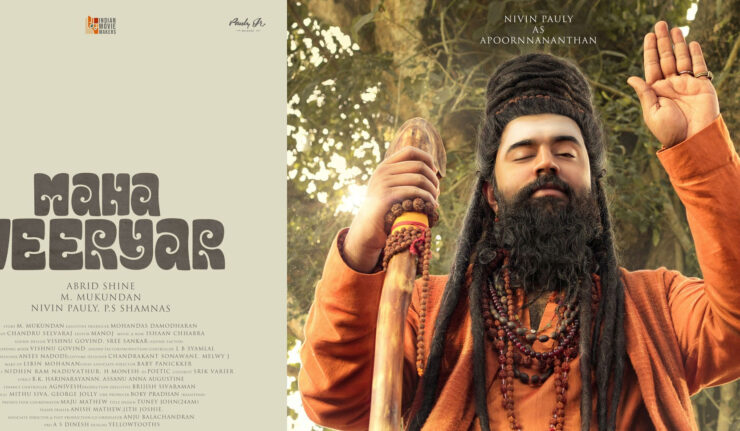Ever since S.S. Rajamouli blended mythology and fantasy with extravagant special effects to create the costume dramas Bahubali 1 and 2, several directors across Indian film industries have tried to replicate his success in the genre. Some have woven history into the mix. Most have fallen flat on their faces. With the winds of experimentation blowing through it for years now, trust Malayalam cinema to stand the trend on its head, making a point and having some fun in the bargain.
Writer-director Abrid Shine’s Mahaveeryar – based on a story by M. Mukundan – combines myth, farce and fantasy with time travel to create an unconventional political satire indicting malleable judiciaries and autocrats. The star-studded film stumbles in several areas, but in the passages where it clicks, it is both hilarious and startling in its cutting commentary.
Mahaveeryar initially operates on dual tracks.

In a land far far away, in the fabled bygone kingdom of Manomaya – a land that is but an illusion, as one gathers from the name – His Highness Rudra Mahaveera Ugrasena (Lal) has a peculiar health problem: chronic hiccups. The Maharaja’s ailment does not appear to have curbed his libido, as his subjects have learnt much to their dismay and dread while he assembled a harem of over 2,000 women with no concern at all for their wishes. At the start of the film, with the enthusiasm of a collector of toys, he orders his Chief Minister Veerabhadran (Asif Ali) to find him another beauty meeting his lofty specifications.
Veerabhadran travels a great distance to a remote village, home of the stunning Devayani (Shanvi Srivastava), and abducts her in the service of the king.

Cut to a rural location in the 21st century. Swami Apoornnananthan (Nivin Pauly) is seated beneath a tree pontificating before a follower when he is accused of stealing a statue from a nearby temple. We had first seen the sage peacefully smoking his chillum in a snow-laden landscape in another realm. The shift in location, his name that means incomplete and endless, and his own words imply that he is more than just a holy man. He is perhaps Time itself.
Apoornnananthan is taken to a contemporary court, where the two tracks in this unusual narrative ultimately meet.
The thread involving Apoornnananthan is comedy at its best, with an under-stated Nivin Pauly in his element and Mallika Sukumaran playing a village elder who brings the house down with her brilliant comic timing.
The sense of humour in this part of the film is at first an intriguing contrast to the uncommon amalgam of grandeur, gravitas, ludicrousness and tragedy in the storyline about Ugrasena, Veerabhadran and Devayani.
(Minor spoilers in this paragraph) In this theatre of the absurd, we see the tables being turned on a woman who is placed in the dock by a man accused of assaulting her. Is this really a mythical space, or does Mahaveeryar simply mirror India of the here and now? In 2022, as the words patriotism and sedition are casually tossed around in the real world, as the draconian UAPA is slapped on real-life activists and oppressed peoples while oppressors roam free, the circumstances on screen bring up these questions. If a ruler commits an injustice, but that ruler is deemed synonymous with the nation, then is not a protest against this injustice a betrayal of the nation? In a place where the king is supreme and a judge in court is his subject, if a crime is committed by the monarch, is it right for the judge to deliver justice to a citizen who has been wronged or is he undermining the country by pronouncing a verdict against the wrongdoer in this instance? (Spoiler alert ends)
The pointedness of these questions and the messaging in this portion are particularly remarkable when viewed against the backdrop of India’s most high-profile film industry, Hindi a.k.a. Bollywood, which has been bowing and scraping before the king in recent years despite having far more resources and power than Malayalam filmmakers.
Sadly though, Mahaveeryar does not completely come together for various reasons.
Firstly, although each character has an important part to play in the political commentary being offered, purely from the point of view of storytelling they lack substance and relatability. Second, while the strand revolving around Apoornnananthan is thoroughly enjoyable, it recedes into the background once Ugrasena enters the courtroom. Even if it is argued that this happens because Time, after all, is an observer and not a participant in the goings-on in the universe, this scripting decision robs the film of considerable impactfulness. The two segments sit uncomfortably together, which is unfortunate because their overlap is designed to spotlight the farcical nature of justice systems across centuries. A lengthy section of the latter half meanders as a result. It also slows down pointlessly.
In addition, the presence of only two significant women characters is glaring in a film that aims to skewer patriarchy in the implementation of laws.
Mahaveeryar therefore does not work in its entirety but where it does work, it is striking. This is Abrid Shine’s third collaboration with Nivin Pauly, the other two being the heartwarming cricket saga, 1983, and the police procedural Action Hero Biju. Mahaveeryar is not the formulaic fare you might expect from a commercially successful star. It is also all the proof you need that Nivin is a risk taker.
I loved the intentional trivialisation of the king in the film, the biting socio-politics, the excellent cast, the special effects especially when used for humour, the lovely music and the Anyplace Anywhere feel of the settings (conveyed, despite the fact that the characters speak Malayalam, by a massive, lavish palace that is more likely to exist in North India or perhaps Mysuru than Kerala, Rajasthani costumes and moves in a dance sequence, and more).
Mahaveeryar is, above all else, a thesis on the self-defeating nature of authoritarianism, social dominance and inequity. Its structural issues make it an uneven viewing experience. More’s the pity, since there is so much that is entertaining and insightful in this tale of an enigmatic Muni, a ruthless Maharaja and a maiden’s tears.
Rating: 2.75 (out of 5 stars)




